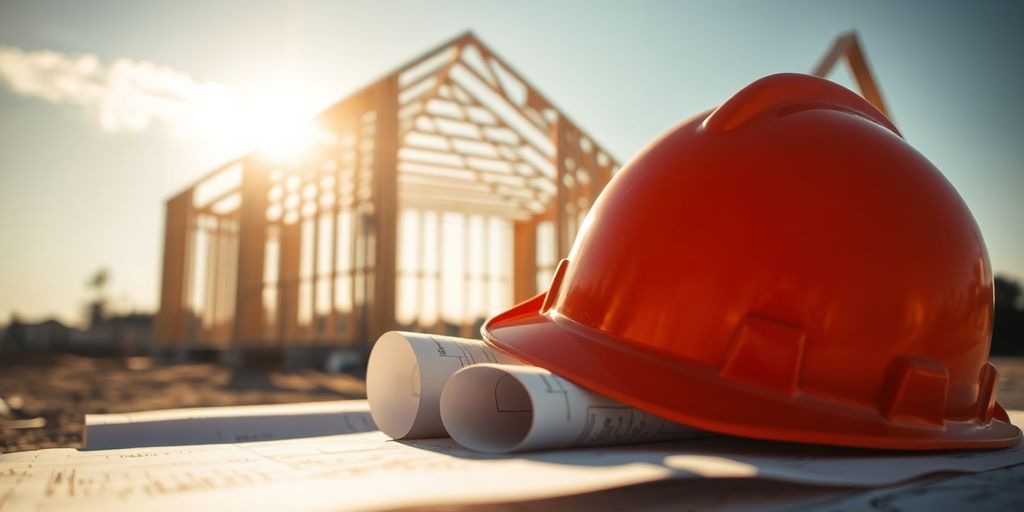Who Offers VA Construction Loans? Your Guide to Lenders and Options
November 19, 2025
Find out who offers VA construction loans and explore your options for financing a new home build. Your guide to lenders and more.

Thinking about building a new home with your VA benefits? It sounds great, but finding out who offers VA construction loans can be a bit tricky. Not every lender provides these specific types of loans, and the process is a little different from a regular home purchase. This guide will help you figure out where to look and what to expect when you're trying to finance your new build using your VA eligibility.
Key Takeaways
- VA construction loans help eligible veterans build new homes.
- These loans can be one-time close or two-time close, affecting how funds are given out.
- Not all lenders offer VA construction loans, so you might need to search around.
- If a VA construction loan isn't possible, you can get a regular construction loan and then refinance it into a permanent VA loan.
- Always ask potential lenders about their experience with VA construction loans and what their specific process looks like.
Understanding VA Construction Loans
Defining a VA Construction Loan
So, what exactly is a VA construction loan? Well, it's a short-term loan designed to help eligible veterans finance the building of a new home. It's not just for buying an existing house; it's specifically for new construction. Think of it as a way to turn your dream home vision into a reality, especially if you're looking to build on land you already own or plan to purchase. It's important to remember that while the VA backs these loans, the specifics are handled by individual lenders.
One-Time Close Versus Two-Time Close Options
There are two main types of VA construction loans: one-time close and two-time close. With a one-time close loan, you only go through the closing process once. The loan covers both the construction phase and the permanent mortgage. This is often seen as simpler because permanent financing is secured upfront. The two-time close option, on the other hand, involves two separate loans and closings: one for construction and another for the permanent mortgage. It can mean more paperwork and fees, but it might offer more flexibility in some situations.
How Funds Are Disbursed During Construction
When you get a VA construction loan, the money isn't just handed over in one lump sum. Instead, the lender releases funds in stages, often called "draws," as different phases of construction are completed. This protects both you and the lender. The builder submits requests for payment as work progresses, and the lender verifies that the work has been done before releasing the funds. This process continues until the house is finished, at which point you transition to your permanent VA loan. It's a system designed to keep things on track and ensure the project moves forward smoothly.
It's important to have a clear understanding of the disbursement schedule and requirements before starting construction. This can help prevent delays and ensure that your builder is paid on time.
Identifying Lenders Who Offer VA Construction Loans
VA-Approved Lenders and Their Role
Finding a lender for a VA construction loan can feel like a quest. The VA itself doesn't directly hand out construction loans, but it guarantees a portion of the loan, which reduces the lender's risk. This guarantee encourages lenders to offer these specialized loans to eligible veterans. You'll need to look for lenders that are VA-approved. These can be traditional banks, credit unions, or mortgage companies. The VA maintains a list of approved lenders, which is a good starting point for your search.
Researching Experienced VA Construction Loan Providers
Not all VA-approved lenders are created equal, especially when it comes to construction loans. It's important to find one with experience in this specific type of financing. Construction loans are more complex than regular mortgages, involving phased disbursements and inspections. Look for lenders who:
- Have a dedicated construction loan department.
- Can provide references from past VA construction loan clients.
- Understand the nuances of VA construction loan requirements.
It's a good idea to ask potential lenders about their experience with VA construction loans, including the number of such loans they've handled and their familiarity with VA guidelines. This can help you gauge their expertise and ensure a smoother process.
The VA's Role in Backing Construction Financing
The VA's involvement is primarily through its guarantee program. This means the VA insures a portion of the loan, protecting the lender if you, the borrower, default. This backing is what makes VA construction loans possible, as it reduces the risk for lenders who might otherwise shy away from the complexities of construction financing. The VA also sets specific requirements for construction projects funded through these loans, ensuring the home meets certain standards. The VA will make sure the project meets their standards, and was built to the correct plans.
Navigating Challenges in Finding a VA Construction Loan
Why Some Lenders Avoid New Construction
So, you're trying to get a VA construction loan? It can be tough. Not all lenders are created equal, and many shy away from construction loans, especially those backed by the VA. Why? Well, new construction involves more risk than buying an existing home. There's the chance of cost overruns, delays, and other unexpected issues that can make lenders nervous. This increased risk profile means fewer lenders are willing to offer these specialized loans.
Strategies for Expanding Your Lender Search
Okay, so the first lender said no. Don't panic! Here's what you can do:
- Widen your net: Look beyond your local area. Check with lenders throughout your state or even in neighboring states. Some lenders specialize in VA construction loans and operate across a wider region.
- Mortgage brokers are your friends: A good mortgage broker knows which lenders offer VA construction loans and can connect you with them. They do the legwork of finding suitable options, saving you time and effort.
- Check credit unions: Sometimes, smaller credit unions are more willing to work with borrowers on construction loans than big banks. It's worth exploring this avenue.
Contacting the VA for Lender Assistance
If you're really struggling to find a lender, don't hesitate to reach out to the VA directly. They might be able to provide a list of lenders in your area that participate in the VA construction loan program. They can also offer guidance on eligibility requirements and the application process.
The VA doesn't directly lend money for construction loans, but they guarantee a portion of the loan, which reduces the risk for the lender. This guarantee is what makes VA loans attractive, but it's still up to individual lenders to decide what types of loans they offer.
Alternative Paths to Financing Your New Home Build

While VA construction loans are a fantastic option for eligible veterans, they aren't the only way to finance your dream home build. Sometimes, finding a lender who offers them can be tricky, or you might not fully qualify. Let's explore some alternative routes to get you into that new home.
Traditional Construction Loans as an Option
Traditional construction loans, offered by many banks and credit unions, are a common way to finance new home builds. These loans typically have a shorter term than mortgages and come with higher interest rates. The funds are disbursed in stages as construction progresses, and you usually make interest-only payments during the build. Once construction is complete, you'll need to secure permanent financing, such as a traditional mortgage, to pay off the construction loan. Keep in mind that these loans often require a down payment, which can be a significant hurdle for some.
Refinancing a Construction Loan into a Permanent VA Loan
One strategy is to start with a short-term construction loan from a local bank and then refinance it into a permanent VA loan once the construction is complete. This approach gives you more lender options initially. However, it's important to ensure you'll meet the VA's requirements for a refinance. This usually means the construction loan must be in your name, and you must meet all standard VA loan eligibility criteria.
Considering Conventional Construction Loans
Conventional construction loans are another alternative, though they typically require a larger down payment and have stricter credit requirements than VA loans. These loans aren't backed by the government, so the lender takes on more risk, resulting in higher costs for the borrower. However, if you don't qualify for a VA loan or are having trouble finding a VA construction lender, a conventional construction loan might be worth exploring.
It's important to shop around and compare rates and terms from different lenders. Don't be afraid to negotiate and ask questions. Building a new home is a big investment, so you want to make sure you're getting the best possible financing option for your situation.
Here's a quick comparison of the options:
Key Questions to Ask Potential VA Construction Lenders

Inquiring About Eligibility and Application Processes
Before you get too far down the road, it's smart to figure out if you even qualify for a VA construction loan with a particular lender. Ask them straight up about their specific eligibility requirements. Don't just assume that because you're a veteran, it's a done deal. Each lender might have slightly different criteria on top of the basic VA requirements. Also, get the lowdown on their application process. What documents do they need? How long does it typically take? Understanding this upfront can save you a lot of headaches later. It's also a good idea to ask if they have experience with VA construction loans specifically, not just regular VA loans.
Understanding Loan-to-Value Requirements
Loan-to-Value (LTV) is a big deal when it comes to construction loans. It basically tells you how much of the project the lender is willing to finance compared to the appraised value of the completed home.
Here's why it matters:
- A lower LTV means you need to bring more cash to the table.
- Lenders use LTV to manage their risk.
- Understanding the LTV helps you plan your budget.
Make sure you ask potential lenders about their LTV requirements for VA construction loans. Find out how they determine the appraised value and what happens if the project goes over budget. Knowing this will help you avoid surprises down the line.
Checking for Prepayment Penalties and References
Nobody wants to get stuck paying extra fees if they decide to pay off their loan early. So, one of the first things you should ask is whether there are any prepayment penalties. Some lenders might charge you a fee if you pay off the loan before a certain date. Also, don't be shy about asking for references. Talking to other veterans who have used the lender for a VA construction loan can give you valuable insight into their experience. Did they have a smooth process? Were there any unexpected issues? Getting insights on credit score from previous borrowers can help you make an informed decision.
Benefits of Using a VA Construction Loan
Advantages of No Down Payment Options
One of the biggest perks of a VA construction loan is the possibility of building a new home without needing a down payment. This can be a huge advantage, especially for veterans who might not have a lot of cash saved up. It's worth noting that while the VA itself doesn't require a down payment, some lenders might, depending on your credit score or the specifics of the project. But generally, the no-down-payment feature makes homeownership more accessible.
Streamlined Financing for Eligible Veterans
VA construction loans are designed to make the financing process smoother for eligible veterans. The VA backs a portion of the loan, which reduces the risk for lenders and can lead to better interest rates and terms for you.
Here's what streamlined financing can look like:
- Easier qualification requirements compared to conventional construction loans.
- Potentially lower interest rates due to the VA's backing.
- Simplified paperwork and processes, especially with experienced VA lenders.
The VA's involvement helps to ensure that veterans are treated fairly and get access to affordable financing options. This support can make a big difference when you're trying to navigate the complexities of building a new home.
Transitioning to a Permanent VA Loan
VA construction loans are typically short-term, covering the building phase. The goal is to transition smoothly into a permanent VA loan once construction is complete. This can be done through a one-time close loan, where the construction loan automatically converts to a permanent mortgage. Alternatively, you might need to refinance the construction loan into a permanent VA loan. Either way, the process is designed to provide long-term, stable financing for veterans.
Here's a quick comparison:
The Process of Securing a VA Construction Loan
Initial Steps for Loan Application
Okay, so you're thinking about building a home using a VA construction loan? That's awesome! The first thing you gotta do is figure out if you even qualify. Get your Certificate of Eligibility (COE). This proves to the lender that you're eligible for a VA loan. You can usually get this through the VA website.
Next, start gathering all your documents. Think pay stubs, bank statements, tax returns – the usual stuff. Lenders need to see you're a good risk. Also, get pre-approved! Pre-approval gives you an idea of how much you can borrow.
Working with a Mortgage Broker for Connections
Finding a lender who actually does VA construction loans can be tricky. Not all of them do! That's where a mortgage broker can be a lifesaver. They know which lenders are active in this area and can shop around for the best rates and terms for you.
Think of a mortgage broker as your personal loan shopper. They'll handle a lot of the legwork, saving you time and stress. Plus, they can help you ask additional questions you might not even think of.
Ensuring Builder Compliance with VA Standards
This is a big one. The builder you choose must be VA-registered. The VA has specific requirements for builders to ensure the home meets their standards. This protects you from shoddy construction and ensures the home is safe and sound.
Make sure your builder is on the VA's list of approved builders. They'll also need to submit their building plans and materials for approval. It's an extra step, but it's worth it for the peace of mind.
Here's a quick checklist:
- Verify the builder's VA registration.
- Review their proposed plans carefully.
- Confirm they're using VA-approved materials.
Wrapping It Up
So, there you have it. Getting a VA construction loan can feel like a big puzzle, but it's totally doable. Remember, the VA itself doesn't hand out these loans directly; instead, they work with a bunch of different lenders. Finding the right one means doing a little digging and asking lots of questions. Don't be afraid to shop around and compare what different places are offering. With a bit of patience and the right info, you'll be well on your way to building that dream home.
Frequently Asked Questions
What is a VA construction loan?
A VA construction loan is a special kind of loan for veterans to build a new home. It helps pay for the land and the building process. There are two main types: one-time close and two-time close.
Who actually offers VA construction loans?
The VA doesn't give out the money directly for construction loans. Instead, they back up loans made by regular banks and mortgage companies. You need to find a lender that works with VA loans.
Why is it hard to find a VA construction loan?
It can be tricky because building a new home has more risks. Many lenders prefer simpler loans. But don't give up! Some lenders specialize in these.
What if I can't find a VA construction loan?
If a VA construction loan isn't an option, you could get a regular construction loan from a bank or builder first. Then, once your home is built, you can change it over to a permanent VA loan.
What should I ask a potential lender?
Ask about their experience with VA construction loans, what documents you'll need, and if there are any extra fees. Also, ask how they pay the builder as the work gets done.
Are there big benefits to using a VA construction loan?
Yes, the biggest perk is often no down payment. This means you don't have to save a huge amount of money upfront to build your dream home.

Alex Chen

Alex Chen













Get in touch with a loan officer
Our dedicated loan officers are here to guide you through every step of the home buying process, ensuring you find the perfect mortgage solution tailored to your needs.
Options
Exercising Options
Selling
Quarterly estimates
Loans
New home

Stay always updated on insightful articles and guides.
Every Monday, you'll get an article or a guide that will help you be more present, focused and productive in your work and personal life.









.png)
.png)
.png)
.avif)
.avif)
.avif)
.png)
.png)
.png)
.avif)
.png)
.png)
.avif)
.png)
.avif)
.png)
.avif)
.avif)